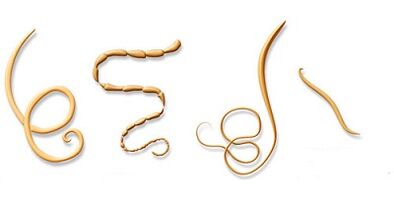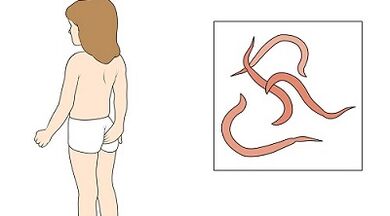To recognize the symptoms in a timely manner and successfully treat parasites in the human body, patients need to see a doctor at the first sign of illness.
Currently, there are about 300 types of microorganisms that successfully exist in human internal organs.
The main route of parasite attack is through dirty hands, objects and food.
Invasive diseases are treated with traditional medicines and medicines; in severe cases, surgery may be required.
The main group of parasites in the human body
Upon entering the internal environment, parasites in the human body consume nutrients or tissue of organs supplied with food.
In the future, the lack of micro and macro elements, minerals and vitamins causes various disorders in the work of all systems and organs in patients.
Main route of infection:
- oral-fecal- parasites enter the human body after consuming contaminated food and water;
- household contact- larvae and worm eggs penetrate a person due to unwashed hands after contact with an infected object or animal;
- through the skin- parasitic larvae penetrate the skin or through insect vector bites.

There are several types of worms:
- round; pita
- ;
- subcutaneous;
- coincidentally;
- cloth.
The ringworm group is the widest and most widespread. It includes ringworm, cream worm, whip worm, toxokara, and worm.
Parasites enter the human body through dirty hands or mouths after eating contaminated food: fruits, vegetables, not heat-treated meats. Round worms settle in the patient's gastrointestinal tract.
Tape parasites include swine and pig tapeworms, tapeworms and echinococcus. The worms of this group are large. For example, tapeworms can reach a length of 25 m.
Being in the human body, tapeworms can eat any tissue and fluid. The source of this parasite is improperly cooked meat and fish.
The next type is a subcutaneous worm. They are most common in exotic countries: the African continent, India, Iraq, and so on.
Signs of the presence of parasites in the human body - the formation moves under the skin, causing severe pain.
Infection of patients with infection occurs through the bite of flies, mosquitoes or rotten lice, i. e. blood-sucking insects.
Flux (trematoda) - hepatic flux (fluke or fasciola), schistosoma, fascilopsis.
Parasites live in the human heart, pancreas, bile ducts and intestines.
Patients are infected with boiled water, milk, unpasteurized cheese, meat and fish that are not processed properly.
Tissue parasites in humans include trypanosomes, Finns, sarcosporidia and microsporidia. Helminths of this group reside in the human lungs, in the spinal cord and brain, and in muscle tissue.
Carriers of parasites are wild and domestic animals: horses, pigs, chickens and others. Tissue worms are spread to humans through undercooked meat.
Symptoms of parasitic pathology
Symptoms and treatment for parasites in the human body vary, depending on the type of worm.
Parasites have been perfectly adapted to be in human organs, making them their home.
People may be completely unaware of the presence of worms, but parasitic attacks intensify the manifestations of chronic pathology in adults and children. Often these signs indicate the penetration of parasites into the human body.
Worms and other parasitic organisms (protozoa or insects) eat and reproduce in the human body.
They infect the patient's eyes, skin, hair and internal organs. And only constant fatigue, drowsiness or obesity indicates that the patient is a carrier of the parasite.

A sick person has the following symptoms of a parasitic infection:
- anemia does not respond to treatment;
- weakness;
- unreasonable hunger;
- sharp weight changes in one direction or the other;
- headache of unspecified etiology;
- constipation followed by diarrhea;
- irritable bowel symptoms;
- heaviness in the liver area;
- joint and muscle pain;
- skin manifestations (rash, neurodermatitis, etc. );
- decreased immunity;
- depression and neurosis;
- insomnia.
During the examination of the patient, the doctor visually examines his skin.
Signs of the presence of parasites in the human body are rashes, acne, pallor, sweat, early wrinkles, cracks, flaking and excessive brittle nails. Often these symptoms indicate that the parasite is present in the patient's GI tract.
If a child is infected with a cream worm, then the signs of parasites in the body are as follows - unbearable itching in the anal area.
Patients suffer from lack of growth, poorly developed auricles, shortened fingers and hair loss, as parasites in children absorb all the nutrients necessary for their development.
Due to the presence of worms in the human stomach and other digestive organs, the mucous membranes become inflamed, and a large white layer forms on the tongue. Such patients must adhere to a diet schedule.
At the end of the examination, the doctor analyzes the general condition of the patient's entire body to identify the manifestations of pathogenic factors.
For example, parasites in a woman's body show its presence in the following ways: patients experience general abnormalities, lower back pain, menstrual irregularities and inflammation of the bladder and kidneys. Men can develop prostatitis and impotence.
Drug Treatment
Parasites reside in a person's lungs, intestines, muscles and internal organs. In children, the symptoms of the disease are the same as in adult patients.
To effectively treat a parasite in a person, the doctor must compile a complete medical history, including a description of the symptoms and a collection of tests. During treatment, patients are given a special diet.
Patients are referred to several tests before they are given antelmintic tablets:
- fecal analysis for worm eggs;
- histology coprogram;
- serological blood tests;
- hemoscanning.
Some pharmaceuticals are used to kill worms in the treatment of parasites in children and adults.
Each anthelmintic drug aims to destroy a specific type of worm in the human body.
Specific antiparasitic agents are prescribed to patients only in situations where the intended benefits outweigh the potential dangers of treatment.
Patients should not choose antihelminthic drugs and treat themselves without consulting a doctor, because drugs in this group are very toxic to humans. In addition, when treating parasites, patients are given a diet.
Traditional methods of fighting parasites
Some folk remedies have antelmintic effects, so the destruction of parasites at home is done with their help.
But before starting treatment, the patient should see a doctor, because a diet containing injections of certain plants can endanger some chronic pathologies of the human body.
Among the common ways to get rid of parasites in the patient's body, here are the most effective:
- garlic tincturefrom cream worms in the human body for the preparation of an enema - to prepare it, you need to knead 10 cloves of garlic, pour a glass of boiled water and leave for several hours;
- pumpkin seedsis a simple method of killing tapeworms in a patient's gut. For treatment on an empty stomach, eat 2 tablespoons of peeled seeds;
- onion infusion- it is used to fight ascaris and cream worms in the human body. Half a can of finely chopped onion should be poured with a solution of forty percent ethyl alcohol and insist for a week in a dark place. Then strain and take 1 tbsp. spoon half an hour before meals. Only adult and non-alcoholic patients can be treated with the infusion;
- walnut decoction- this medicine is used for ringworm in the human body. Unripe fruits are crushed, poured with boiling water and injected overnight. Then they drink in portions every day.
Following the recommendations of traditional medicine, you can remove worms from the human body with the help of burning spicy foods.
But they should be used sparingly against parasites in patients, as they have an irritating effect on the mucous membranes.
Pepper, ginger, mustard, garlic, onion, carrot and clove have a clear burning characteristic taste, which is unacceptable for worms in the human intestine. From medicinal herbs against worms, wormwood is often used.
Pharmacies offer many drugs to kill parasites in the human body, but many of them have side effects and affect health.
Not all drugs to get rid of helminths in the human body are allowed for pregnant women and children.
Precautions to prevent parasitic infections
Precautions are the most effective method to protect against parasites in the human body. From an early age, everyone is taught to wash their hands after working in flower beds, toilets or walking along the road, as soil and dust contain worm eggs.
Before traveling to the exotic at the equator, people should get all the necessary vaccinations to avoid getting sick with helminths.
Following simple precautions, anyone can protect themselves from possible infection with parasites.
Personal hygiene rules:
- Wash hands and space under the nails regularly - this must be done after working in the sand, soil, after using the toilet, communicating with animals and before eating;
- nails should be cut short, as parasitic eggs can accumulate under the nails;
- Vegetables, berries, fruits and other fruits and herbs should be washed for a long time under running tap water. This ensures that all worm eggs are washed off their surface;
- meat and fish should be treated with full heat. Meat with blood can endanger human health, as it contains eggs and parasitic larvae;
- you should not drink boiled water from wells and springs, as it may contain parasites;
- water and milk can only be drunk boiled to kill worms;
- pasteurized lactic acid products should be consumed. Raw cheese can contain eggs and parasitic larvae.
Experts recommend that you check regularly for parasites in the human body.
Do not take antihelminthic agents as prophylactic parasites on internal organs, as they have toxic effects.
Treating parasites in the human body in any form can be dangerous to health. If there are pets in the family, then they must be wetted regularly.
Preventing parasites in the human body can help prevent many harmful worms.
Adhering to the basic rules of personal hygiene can protect all family members, because helminthiasis in the human body is one of the most unpleasant parasitic diseases that interfere with the functioning of all internal systems and organs.
























